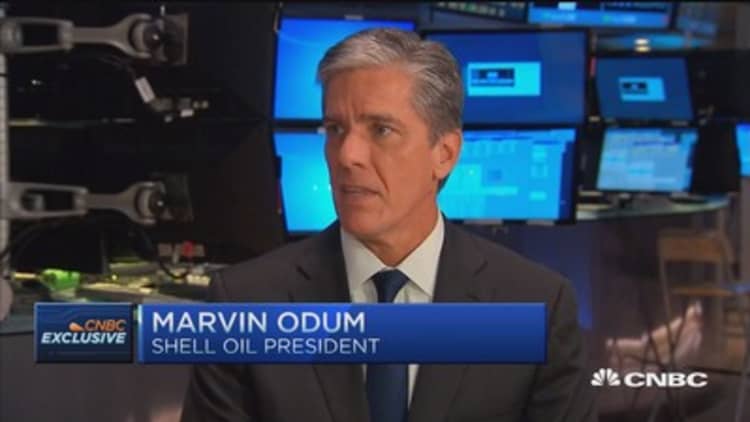
Oil exploration in the Arctic is a long-term game, and not dependent on the current price of crude, Shell Oil President Marvin Odum said Thursday.
Shell's Polar Pioneer rig is making its way toward Alaska's north slope now that President Barack Obama has given the company conditional approval for oil drilling in the Arctic Ocean.
"These are potentially very large resources, but resources that would come online 10, 15, 20 years from now, so the current oil price is actually somewhat irrelevant. The size of the resource is what's important," he said in an interview with "Closing Bell."
The Arctic is estimated to contain about 20 percent of the world's undiscovered oil and natural gas.
"This is not an inexpensive program," Odum said. "Drilling season in Alaska, which basically takes place over the summer, is over $1 billion expenditure for one year."
While fracking can be done for less, he said the cost for drilling in the Arctic was worth it because unlike onshore fracked wells, offshore wells can get very strong production rates for a very long time.
"In a place like Alaska, where it's remote, where you go to great expense to make sure you do things exactly right to protect the environment and otherwise, it still makes economic sense to do it," Odum said.
Read More
Shell has not drilled in the Arctic since 2012, when the company was forced to evacuate its Kulluk drill rig, which eventually ran aground.
Odum said the company is well-prepared to avoid another disaster like the Deepwater Horizon oil spill in the Gulf of Mexico in 2010.
"We seriously just think about what's every possible thing that could go wrong, how do we mitigate that to keep it from ever going wrong, but also if it did go wrong for some reason—very, very low probability—but if it did, are we prepared to respond to it?" he said.
Shell proposes to drill up to six wells in water about 140 feet deep, using two vessels that can serve as relief wells for each other in case of an emergency.
Odum noted that it will take about two years of drilling to identify how many resources there are, and then the company will begin thinking of a development program.
Read MoreToo early for Saudi to declare oil victory: Expert
He also doesn't envision a crowded landscape. Instead, he sees the opportunity for very select developments.
"I don't think it will be like the Gulf of Mexico where there's a vast number of companies and opportunities," Odum said. "There'll be a few players who really know how to do it the right way."
—Reuters contributed to this report.


